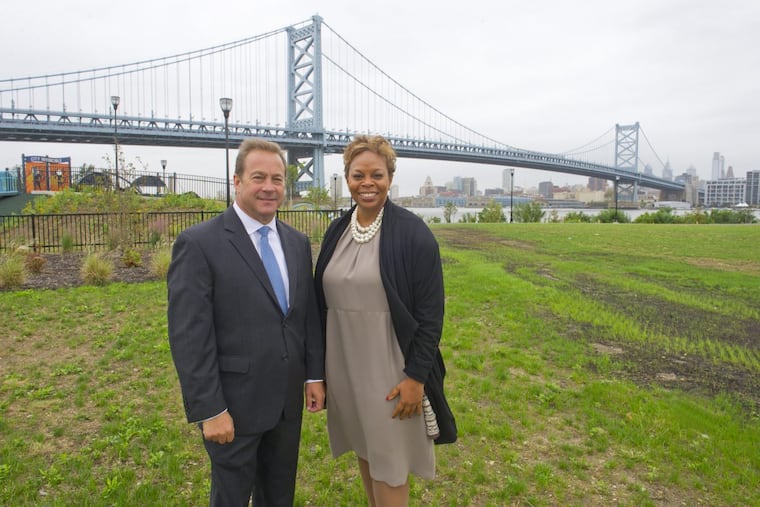What scrappy Camden offers Amazon others can't: A chance to lift up an entire city
Camden's struggles should be seen as an asset, not a liability, in the competition for 50,000 Amazon jobs.

From the North Camden waterfront, the steel arc and granite anchorages of the Benjamin Franklin Bridge offer a majestic blue-and-gray display of 20th-century urban aspirations.
If Camden's audacious and, to my mind, potentially persuasive bid for the second Amazon headquarters campus is successful, the bridge and the city's other assets — and, perhaps, its challenges too — will have helped the city realize its latest aspirations as well.
"Camden has a location to offer that's second to none," Mayor Dana L. Redd declares. "We have developable land that is ready to go."
Thursday is the deadline for metropolitan areas and municipalities in the United States and Canada to submit their entries into what might be called Amazon's international beauty pageant, which offers the chance to bring home a $5 billion economic development crown bejeweled with 50,000 high-paying jobs.
Dozens of cities, including Boston, Detroit, Toronto, and, closer to home, Philadelphia and Wilmington, are preparing bids. Three other New Jersey cities — New Brunswick, Jersey City, and Newark — also are in the running; the quasi-public Choose NJ organization is apparently choosing to highlight Newark, although Camden is free to pursue its own pitch. And Amazon says it welcomes all.
Camden's application is finished and is being reviewed by the N.J. Economic Development Authority prior to submission to Amazon. City officials told me the 130-plus-page document, developed by Camden County and the Cooper's Ferry Partnership in Camden, showcases the availability of 140 "shovel-ready" acres downtown and along the Delaware River north and south of the Ben Franklin.
It also highlights the new corporate headquarters and other recent major economic development projects in the city; the plentiful capacity of existing mass transit service; and the availability of workforce housing opportunities along these transit lines inside as well as outside the city.
But officials said the application also pitches Camden as a unique opportunity for Amazon, a company generally regarded as having progressive sensibilities, to magnify the impact of the second headquarters project beyond what it might be in less challenging places.
"To land Amazon would be transformational on so many levels," Redd said. "Amazon wants to have social impact. And Camden is a prime place [for the company to] have social impact, and change people's lives."
I met with the mayor and Camden County Freeholder Director Louis Cappelli Jr. on Friday morning near the waterfront walkway by the site of the demolished Riverfront State Prison in North Camden. The parcel is vacant and has been previously eyed for major office development, like that rising on the south side of the bridge.
"Getting Amazon to commit to hire residents of Camden is the biggest priority," Cappelli said. "We have to reduce the poverty level in the city, and Amazon would have to help us and be committed to doing it."
The very idea that poor little Camden — until recently, a winner only of dubious distinctions — would dare to imagine itself in the same league with bigger, richer, and hipper cities has of course inspired naysayers and pooh-poohers online and elsewhere.
But I see the bid as reflecting the same scrappy sort of faith in the future that made the Ben Franklin Bridge possible a century ago. And Camden does possess many of the attributes Amazon is looking for, particularly regarding location: It has ready access to the airport, good mass transit service, and quality institutions of higher education.
"The city is a burgeoning hub for innovation that will serve Amazon well," Rutgers-Camden Chancellor Phoebe Haddon said. "Business and tech start-ups have taken root and are beginning to thrive in Camden, and global corporations are doing likewise."
The city also has genuine momentum, stemming largely, but not entirely, from public safety improvements, broader educational choices, and a spectacular array of brand-name — albeit, heavily state-subsidized — economic development projects.
"No city in the country has gone through a more stunning turnaround than Camden has over the last decade, and that's due to unprecedented cooperation at every level — business, the community and state and local government," said George E. Norcross 3d, the Cooper University Health Care chairman widely seen as the driving force behind the city's evolution.
"That sort of vision and [those] partnerships are why Amazon isn't just good for Camden, but Camden would be good for Amazon," he added.
Howard Gillette, a retired Rutgers-Camden history professor and author of Camden After the Fall, a landmark book about the city, said he hopes the application offers Amazon a road map to do more than simply build eight million square feet of office and other space.
"Is the proposal in any way going to say there will be a master planning process that would enable Amazon to help Camden overcome 50 years of disinvestment and flight?" Gillette wondered.
"Historically, big projects have been done in Camden in isolation from building workforce housing and doing other things that need to be done to uplift the city," he said.
"Maybe the county and city really do have plans to capture the value of the Amazon project, not just to bring in bricks and mortar and white people from the suburbs, but to transform Camden."
Gillette would have liked Camden to partner with Philadelphia, a suggestion I made in an earlier column. That approach would have made sense.
But Redd and other New Jersey officials point out, correctly, that an Amazon campus in Camden would benefit both sides of the Delaware. And while I believe Philly is a great city, with a strong chance of landing the project, I'm pulling for the City Invincible.
Go, Camden!